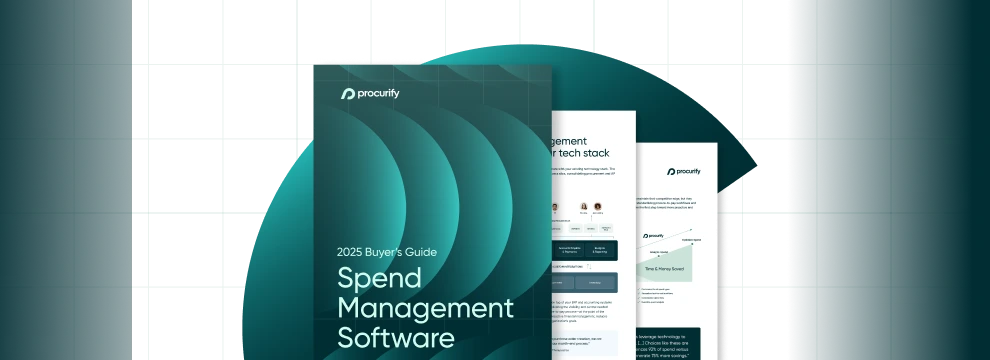Managing Financial Operations in a Remote World: Wajdi Ghoussoub
Determining your spend culture and knowing how to effectively manage financial operations is like determining your parenting style. Do you hover over every manager-vendor interaction? Or, do you give departments the freedom to explore options?
Wajdi Ghoussoub is CFO of Plooto, a Toronto-based accounting software company. He’s also a former VC and new dad, something that has taught him a surprising amount about work.
In this episode of our podcast, we talk to Wajdi Ghoussoub, CFO of Plooto, about decentralizing the finance structure, understanding what makes a good startup, and how his company responded to the global pandemic.
Introducing Wajdi Ghoussoub, CFO of Plooto
💵 What he does: Director of Finance and Operations at accounting software company Plooto.
💡 Key quote: “If you spend quality time at home and you enjoy your life outside the office — time in the family, time being social — you become a better manager and you become better at work. And if you’re enjoying your work and you’re doing great things at work, that translates into you becoming a better parent, a better family. So they feed off each other.”
👋 Where to find him: Twitter | LinkedIn
Listen to the episode here
Listen to Spend Culture: Stories of CFOs and Company Culture
Episode summary
On this episode of Spend Culture Stories, Wajdi explains Plooto’s clear but decentralized finance structure, what makes a good startup, how Plooto manage financial operations, and why his company responded to COVID-19 by increasing benefits.
Plooto’s finance team works more like the parent you go to when you need money, rather than the helicopter figure constantly poking into your business. “The managers own vendor relationships. Finance is just there to help negotiate, to execute the payments, control the cash, and to do an onboarding process with the right approvals,” Wajdi says.
Giving managers agency over their own vendor deals helps get them invested in the negotiation process. “It empowers the functions to try to get the best deal, because they’re going to be the ones using whatever tool, supplier, or contractor we’re working with,” he explains.
The managers do their own research, but they must still convince Wajdi to sign the digital check. “It’s like you’re pitching,” he says. “We do this as a check-and-balance, to make sure everyone’s on the same page.”
And just like between parents and children, there’s a bit of internal negotiations. “When we do the budget every year, people come and say, ‘I want to increase the spend from this to that,’” he says. Having observed startups from the outside as a VC and now from the inside, Wajdi also explains startup dos and don’ts and how COVID-19 has changed expectations.
Top takeaways from this week’s conversation
COVID-19 is an opportunity to fix the way you treat employees 🩹
Like most companies, Plooto’s initial response to lockdown was to freeze spending and hope it would blow over soon. But as it became clear that that wasn’t going to happen, Wajdi says the company adjusted its attitude.
“In early April, we decided to revamp our benefits. We put more emphasis on medical-related stuff, [and] we eventually introduced cover for meditation apps. We started doing virtual sit-downs at the end of some days, where we talk about what’s working, what’s not working.”
According to Wajdi, COVID-19 has pushed companies to treat employees more compassionately.
“It pushes us to do the things that we should do at normal times,” he says. “It’s just that now it’s even more required. In normal times, you could be a good listener four days out of five, but now you’re forced to be a good listener every day. You have to be very aware of what people are going through outside work.”
Plooto has a very clear spending process 📋
Wajdi may take a hands-off approach when it comes to finding vendors, but managers still have to follow a rigorous system to convince him to pony up from the company coffers.
For example, once they’ve identified a need for a new digital tool, managers have to convince finance of the benefits. If they get an initial green light, they do more research, looking into the best options. They present these findings over a call or email. If finance is convinced, they get another green light. At that point, Wajdi says, “We always go back and say, ‘Try to negotiate, try to get a better price.’”
After finalizing the price, contracts are signed and the managers and finance leaders fill out and sign an internal form, which goes to the controller.
“Then when we come to the budget, because we were involved and the managers were involved, it becomes a very easy discussion,” Wajdi says.
There is no ‘one thing’ that makes a startup succeed or fail 🤷
Want to know the secret to building a successful startup? Sorry — “There is no magic formula,” Wajdi says.
He does, however, have a few pieces of advice for the finance team and generally. First, make sure the product is sound. This will save you money on sales and marketing. If you incorporate desirable features — or hacks like a networking effect — into the product, “You let the product sell itself.”
Speaking of networking, CFOs and CEOs need to maintain close ties with investors, “so you can quickly raise a round, you can quickly have access to funding. You can build a great thing but then you get stuck with no fund. So you have to always have this network and these connections.”
One area not to skimp on is hiring, both in terms of getting the right people in the door and setting them up to succeed. “You can’t just expect people to come and do work. You have to commit to training and to development,” Wajdi says.
Top highlights from the podcast
Answering ‘What are you good at?’
[5:36] “Becoming a finance operator was a natural progression. It was time for me to jump to the other side of the table, to fill that gap in my experience, to learn something new and to be in the trenches. I wanted to develop that kind of expertise. It’s always hard to answer the question ‘What are you good at?’ when you’re in professional services, because you jump from one thing to another and you tend to be a generalist.”
The first step in changing is accepting that change is necessary
[7:44] “In the beginning of the COVID pandemic, we were trying to live our lives as if nothing had changed — it was just that we were working from home. We were clinging to that idea for a while. And then eventually we realized that no, things are different. People have fears and communication is different. Dynamics are different. The way you live your life outside work is different. When we grasped that idea and we understood it fully, and when we embraced that change, things started to look a bit easier. You kind of give up and you say, ‘OK, this is the reality in front of me. How can we make the best out of it?’”
Plooto’s company culture is still in its petri dish stage
[12:07] “When you’re a company at our stage, we’re still building the culture and it’s changing all the time. Plooto today is very different than Plooto a year ago. That’s what I love about companies of this size: they’re always changing and we’re building the culture. This COVID experience taught us how to stick together, how to work it out as a team, and we learned a lot from it as a company. We’re going to get out of this much stronger, and we’re always going to look back at this as a learning stage. That’s how we’re looking at it.”
How to earn high fives from Wajdi
[22:58] “I have a manager on the team that loves negotiating with vendors. He loves it! He actually tells others, ‘If you want help negotiating with your vendors, let me know. I’ll help you.’ That’s how much he loves to talk and get a good deal. And we give high fives to people who do that, who are successful with that.”
Fail sooner rather than later
[28:41] “Companies that fail are those that tend not to listen to advice, to their customers, to their employees. And they take their time in failing. If you realize that things are not working out, just cut your losses and fail fast. Failing fast is not something to be ashamed of — it happens. Failure that’s derailed over time just makes things worse.”
From issuing orders to changing diapers
[33:57] “I continue to be demanding at work and demanded at home. At work, I expect a lot from people: I have high expectations and I like to get things done quickly to a good quality. I’m always pushing people I work with to go that extra mile, so I’m very demanding in a sense. But I do it so that people develop, I develop, the company as a whole develops and we all grow. At home, I’m demanded. Getting help with childcare is very expensive so it’s just me and my wife. Often my wife calls me at 4 p.m.: ‘Please come home. Today is a bad day.’ So I go home and help, and then at 9 p.m., I open the laptop again.”
Our favorite quotes
[1:47] “Kids teach us to be better managers. I’ve learned a lot from my kid about how to do things at work. You’d be surprised how both things feed off each other.”
[11:23] “During COVID, our spend on benefits increased. It made sense because it’s a hot topic now — it’s top of mind — so while we did cut a lot of things, this was an area where we actually invested.”
[24:45] “When I was in VC and I used to do due diligence on companies, there was always this thought: ‘What’s the perfect formula? Let me plug in the numbers and see if the result is yes or no.’ Unfortunately, it doesn’t work that way.”
[28:22] “Build a resilient company over the long term. You don’t want a company that just lives off short-term goals and short-term results. You want to build something sustainable in the long term.”
That’s not all, folks
If you’re interested in hearing more stories from other forward-thinking executives, you may enjoy these Spend Culture episodes:
- Ryan Lazanis of Future Firm: Forward-thinking accountants in the new normal
- Nilly Essaides from The Hackett Group: Measuring the impact of finance digital transformation
For more tips on remote work practices for accounting teams and finance leaders, check out:
Subscribe and help us grow
Did you enjoy the podcast? Subscribe to the Spend Culture podcast on Spotify, Apple Podcasts, or wherever you listen to podcasts. If you have an extra 10 seconds, please leave us a rating or review to help us grow. Have recommendations for future podcasts? Contact our host at dani.hao [at] procurify.com.

